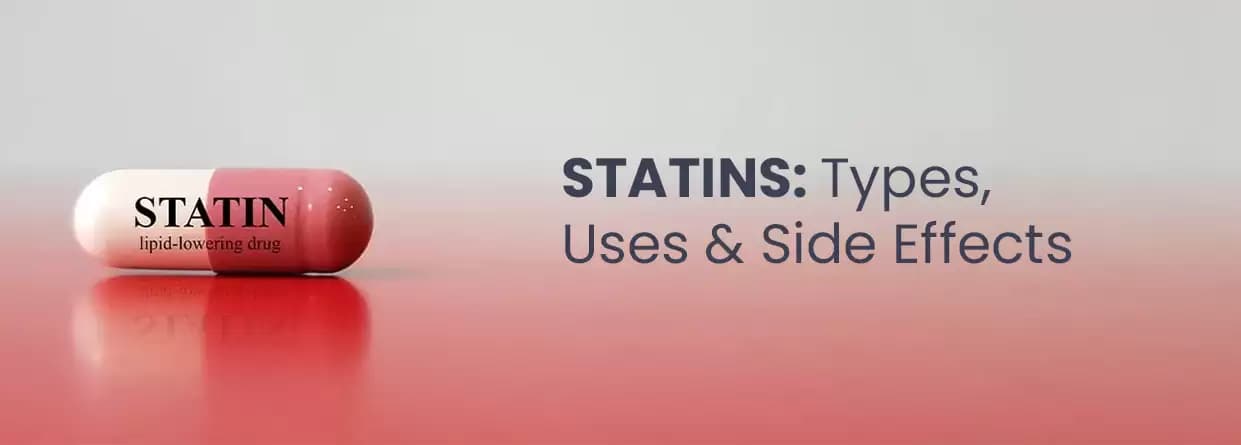
Statins also referred to as HMG CoA reductase inhibitors are prescribed drugs to the patient that benefits people in bringing their cholesterols levels down to normal. Some statins can reduce LDL or bad cholesterol by around 50% or even more.
In the cardiovascular health era, some medications have managed to attain as much attention and recognition as statins. These immensely recommended drugs have evolved cholesterol levels management and have become an important constituent when it comes to preventing cardiovascular illnesses. It doesn’t matter where you have heard about statin drugs, it is important to understand the basics, mainly for people who want to maintain their heart health and lead quality of life. In this blog, we will dig deep into the statins world, offering you comprehensive information on these drugs. We are going to explore the side effects, benefits, and its role in the medical realm. If you are new to using statin drugs and aren’t aware of the basics, book your appointment with a cardiologist BM Birla Heart Research Centre and know everything about it. Now, let’s get started with the discussions.
Statins also referred to as HMG CoA reductase inhibitors are prescribed drugs to the patient that benefits people in bringing their cholesterols levels down to normal. Some statins can reduce LDL or bad cholesterol by around 50% or even more. Nowadays, different statin drug brands are there in the market which include generic statins that are affordable as well. Statins are capsules or pills that should be swallowed once a day. Labels on the statins bottle mentions, at time what it should be taken or if the patient needs to take it with the food.
Different types of statin drugs are there which include:
Statins help in reducing the LDL cholesterol levels flowing from the liver into the bloodstream. Statins impede LDL production by restricting the enzyme referred to as 3-hydroxy-3-methyl-glutaryl-coenzyme A reductase, causing low LDL cholesterol. Statins also assist in lowering the triglycerides level. Since statins help in lowering LDL and triglycerides, they can also benefit in increasing the good cholesterol levels known as HDL.
Even when statins help in managing cholesterol levels, not everyone is required to take them. It is recommended to get in touch with a doctor to discuss if statin drugs are right for you or not. However, here are some factors indicating whether you are the right candidate or not:
One of the primary statins uses is bringing down the cholesterol level and preventing the risk of heart attack or stroke. Our body can use cholesterol when it produces vitamin D, acid, and hormones for food digestion. However, if we have excessive cholesterol in the blood, then it can lead to collecting inside the arteries. As a result, it causes obstacles making it harder for the blood to transmit through blood vessels.
If cholesterol continues to build in the arteries, it can harm more than just making them narrow. The chances of unstable blood vessels increase and break open, causing a heart attack.
Most statin drugs benefit in lowering LDL, HDL, and triglycerides. Reducing cholesterol levels with statins helps in eliminating the stroke, heart attack, and other vessel-related diseases risk. Statins are among the best treatment option for cholesterol level management.
Statin drugs also offer more advantages other than that of managing cholesterol levels. For instance, they benefit in stabilizing the blood vessel lining, hence reducing the risk of a heart attack. Statins also benefit in preventing cholesterol from producing in the liver and also help in relaxing the blood vessels leading to a reduction in blood pressure levels.
Statin drugs don’t cause serious side effects but can cause mild ones. It includes:
In rare cases, statin might cause severe side effects such as:
Every individual’s body is different, and it is essential to understand that there is no solution like one-size-fits-all. Statins are among the finest options for some people with high cholesterol levels, while for some people, lifestyle changes might do wonders. Statins help to avert the risk of a stroke or a heart attack, but they are not a treatment option for high cholesterol. If you have cholesterol, make sure to include exercising and eating a healthy diet in your lifestyle, even if you are taking statins. It is recommended to keep track of your cholesterol levels, as it will also help you understand if your statins are managing it well. It is recommended to book your appointment with a cardiologist in Kolkata at the BM Birla Heart Research Centre in Kolkata and know your options, including what is suitable for you.
Inhibiting 3-hydroxy-3-methylglutaryl coenzyme A (HMG-CoA) reductase is a statin.
Rosuvastatin and atorvastatin are the best forms of statins
Lipophilic or hydrophilic are the two classes of statins
Written and Verified by:

Dr. Rakesh Sarkar is a Senior Consultant in Cardiology & Electrophysiology at BM Birla Heart Hospital, Kolkata, with over 11 years of experience. He specializes in complex arrhythmia management, including atrial fibrillation, ventricular tachycardia, CRT-D, and conduction system pacing.
Similar Cardiology Blogs
Book Your Appointment TODAY
© 2024 BMB Kolkata. All Rights Reserved.